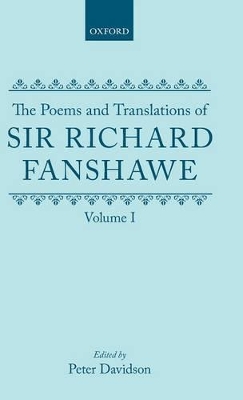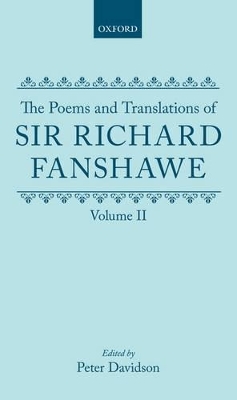Oxford English Texts
2 total works
This is the first full collected edition of the works of the seventeenth-century poet and translator Sir Richard Fanshawe, an exceptionally gifted linguist, recognized in his won life-time as a fine Latinist and renowned for his verse translations from Latin, Italian, Spanish, and Portugese, as well as from English into Latin. The vitality of Fanshawe's translations evokes a sense of genuine passion felt by the translator and communicated through his re-working of
the texts, in addition to providing more mechanical evidence of his linguistic and poetic competence. This volume contains a thorough commentary, containing a significant amount of new information and providing and acute and sympathetic critical assessment of Fanshawe's work.
Much of the material in this edition appears in print for the first time and is base on a completely new corpus of authoritative printed material in Britain, America, and Portugal. In many cases, the text is drawn from printed texts marked up by Fanshawe or his immediate family, or from manuscripts originating close to the poet himself, thus representing his works in the form in which they were known in Fanshawe's family and immediate circle. Original spelling and punctuation are, similarly,
closely adhered to throughout. Davidson also provides a full and detailed commentary on Fanshaw's less-familiar original poems and incorporates a chronology of Fanshawe's life and works, thus setting his translations in the context of the political realities and quotidian existence of
seventeenth-century England.
the texts, in addition to providing more mechanical evidence of his linguistic and poetic competence. This volume contains a thorough commentary, containing a significant amount of new information and providing and acute and sympathetic critical assessment of Fanshawe's work.
Much of the material in this edition appears in print for the first time and is base on a completely new corpus of authoritative printed material in Britain, America, and Portugal. In many cases, the text is drawn from printed texts marked up by Fanshawe or his immediate family, or from manuscripts originating close to the poet himself, thus representing his works in the form in which they were known in Fanshawe's family and immediate circle. Original spelling and punctuation are, similarly,
closely adhered to throughout. Davidson also provides a full and detailed commentary on Fanshaw's less-familiar original poems and incorporates a chronology of Fanshawe's life and works, thus setting his translations in the context of the political realities and quotidian existence of
seventeenth-century England.
This volume completes the first edition of the collected works of the early modern poet and translator Sir Richard Fanshawe, and contains Fanshawe's translation of The Lusiad of Camoes, the single work which affirms his importance in the history of translation. The translation of the Baroque play Querer por solo Querer from the court of Philip IV of Spain is also given, as is Fanshawe's Latin rendering of parts of The Lusiad, discovered by
the present editor and here printed for the first time.
As in Volume I, copy texts for The Lusiads and Querer por solo Querer are manually-corrected printed texts with provenances in Fanshawe's family and immediate circle, thus representing the works in a form which is as close as possible to Fanshawe's final intentions. The Specimen rerum a Lusitanis is taken from a presentation manuscript compiled under Fanshawe's direction. This volume also features an an expert essay on the translation of Camoes, contributed by
Professor Roger Walker.
the present editor and here printed for the first time.
As in Volume I, copy texts for The Lusiads and Querer por solo Querer are manually-corrected printed texts with provenances in Fanshawe's family and immediate circle, thus representing the works in a form which is as close as possible to Fanshawe's final intentions. The Specimen rerum a Lusitanis is taken from a presentation manuscript compiled under Fanshawe's direction. This volume also features an an expert essay on the translation of Camoes, contributed by
Professor Roger Walker.

